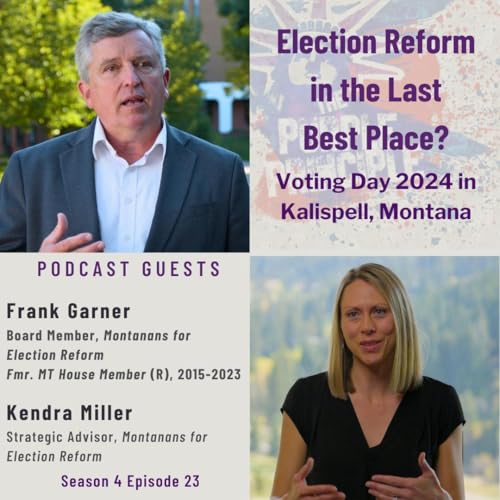“The notion of getting rid of a closed primary system in Alaska appealed to me instantly,” says former Alaska House Speaker Bryce Edgmon who has represented Bristol Bay and parts of the Aleutian Islands for nearly two decades. “It overrode right there almost on the spot any trepidation I might have about having to rank candidates or anything else that would eventually become part of the ballot measure that narrowly passed in Alaska.” Rep. Edgmon is referring to Alaska’s first-in-nation passage of a final or top four voting system with a unified open primary plus ranked choice general election. In this episode we examine the dynamics of the first state legislature in the country to have been elected by this system in 2022, even as a ballot measure to repeal the system has been put before Alaska voters in 2024. We also discuss the dynamics of the Alaska legislature with Anchorage Daily News Reporter, Iris Samuels, and University of Alaska Southeast Political Science Professor, Dr. Glenn Wright. “Alaska is fairly unique in that even before this election reform, we've had bipartisan and tri-partisan coalitions in the House and Senate,” says Samuels, who covers the Juneau State House. “But it has reinforced that phenomenon and made it possible for elected officials to envision doing that and not experience repercussions from within their party and from voters.” “If you talk to incumbent politicians,” explains Dr. Wright, “ they will tell you that they're less concerned about the primary challenge now– that before the reform that was in the back of their mind. And they were thinking not about what do voters in my district want but what do party primary voters in my district want.” AFL-CIO President Joelle Hall has also observed what might be a similar deepening of Alaska’s cross-partisan tendencies in the two years since passage of the top four reform. “One of the ways that we are really different is that we have always come to a bipartisan coalition at the end of every decade,” observes Hall, a legislative lobbyist for nearly three decades. “Redistricting happens. Then slowly the two parties claw back to roughly even. So it's accelerated what is already a normal path in Alaska where we gravitate towards these coalitions. But our final guest on this first of two Alaska episodes, Rep. Alyse Galvin of Anchorage, cautions that these post reform dynamics have not yet translated into legislative action. That’s partially because senior house leadership has blocked several bipartisan legislative efforts, while others were vetoed at the executive level. “if we don't allow this to play out a bit more, I'd say one more cycle, maybe two,” says Galvin, previously a two time candidate for the US House, ”then we're really missing a big chance to get things done that will give Alaskans hope.” Tune in for five different perspectives on the first legislature in the country elected by final or top four voting as citizens in four other US states (NV, ID, CO & MT) consider passing the Alaskan model for less divisive elections toward more collaborative governance. The Purple Principle is a Fluent Knowledge production. Original music by Ryan Adair Rooney.
Show More
Show Less
 25 mins
25 mins 16 mins
16 mins 19 mins
19 mins Oct 23 202432 mins
Oct 23 202432 mins 37 mins
37 mins 46 mins
46 mins 29 mins
29 mins Aug 28 202436 mins
Aug 28 202436 mins
